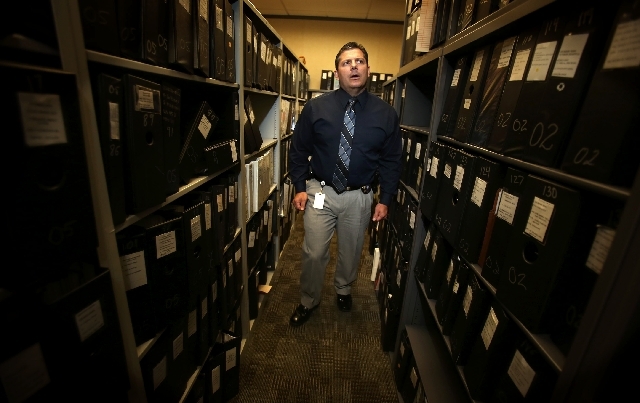Las Vegas police losing grant to review cold cases
A federal grant that has helped Las Vegas police solve dozens of cold case homicides and sexual assaults since 2009 is drying up.
In 2009, police received a federal grant that provided extra funding to investigate homicide and sexual assault cold cases. The resource helped detectives identify situations where testing DNA evidence would be beneficial.
“It was a huge asset,” Las Vegas homicide Lt. Ray Steiber said. “It was a tool we were using to rejuvenate these cold cases where forensic evidence existed.”
Las Vegas police currently have more than 1,000 cold case homicides dating back to 1943.
The $499,695 grant from the National Institute of Justice has helped detectives solve 25 homicides after leads were exhausted, as well as dozens of sexual assault cases.
“A case never closes. It gets reassigned. It gets handed down to the next guy,” said Steiber, adding that a fresh perspective can be helpful. “At times, it’s beneficial because you have a new set of eyes looking at it.”
Las Vegas police recently received notice from the National Institute of Justice that the grant is being suspended because of federal budget cuts, and won’t be available again until 2014.
While Steiber said that not being able to renew the grant, which is expected to run out in June, will hurt certain cases where DNA evidence is available, but it won’t stop investigators from pursuing closure.
“It’s just one tool taken out of our bag for the time being. We’ll adjust,” he said.
Detectives log extra hours researching and prioritizing older cases, attempting to identify those where DNA evidence might be available for testing.
The Metropolitan Police Department’s forensics lab, which handles crime scene DNA testing, is more than a year behind in processing its case work, according to DNA lab manager Kim Murga, one of those who pursued the grant for the first time in 2009.
Lab technicians have to put in extensive overtime to process cold case DNA specimens. The grant, Murga said, paid for the overtime.
Now, with the grant drying up and cuts to the department’s budget, police will have to look for funds elsewhere to sustain their cold case efforts.
“You start taking a look at the not so essential day-to-day things,” Sheriff Doug Gillespie said. “You prioritize where it is that the funds will be spent.”
The grant also helped police streamline their entire cold case process.
“We didn’t really have any resources to evaluate cold cases” before the grant, Murga said.
Initially, detectives had identified 40 cold case homicides and 100 sexual assault cases for new DNA testing. By the time the grant expires, investigators will have processed DNA from more than 1,000 cold cases, including more than 100 homicides, Murga said.
The emphasis on cold cases cast a new light onto some older crimes. Advancements in training, knowledge, experience and technology have come so far that detectives are able to see more.
“They didn’t have our advanced practices,” Steiber said of the original investigators in some older cases. “They might have not known what to look for.”
Cases like the 1978 slaying of 22-year-old Barbara Ann Cox. Or the 1994 murders of 27-year-old Tina Gayle Mitchel and Althea Williams. Detectives used DNA evidence to link suspect Nathan Burkett to the three slayings.
Burkett is being held at the Clark County Detention Center.
Although every cold case DNA sample that is processed won’t lead to an arrest, it doesn’t mean testing was a wasted effort, Murga said. Every sample processed is stored in a database. When police receive DNA samples from felons, they can cross-reference them against the ever-growing CODIS database, the FBI’s Combined DNA Index System.
DNA taken from Burkett in a previous voluntary manslaughter guilty plea was linked to evidence in the cold cases submitted to CODIS by detectives in 2010.
Had it not been for the federal grant that enabled that, those cases may never have been solved.
Police know that some crimes may never end with an arrest. Witnesses die, suspects die.
“Those will always, unfortunately, be unsolved,” Steiber said.
But detectives will continue to work cold cases, even when faced with dwindling resources, because they know the families of victims are waiting for the call that tells them their loved one’s attacker is finally behind bars.
“Being able to close out someone’s life like that, the chapter with all the bad memories, it brings a good sense of satisfaction to be able to give families some sense of closure,” Steiber said.
Contact reporter Colton Lochhead at
clochhead@reviewjournal.com or 702-383-0264.




























